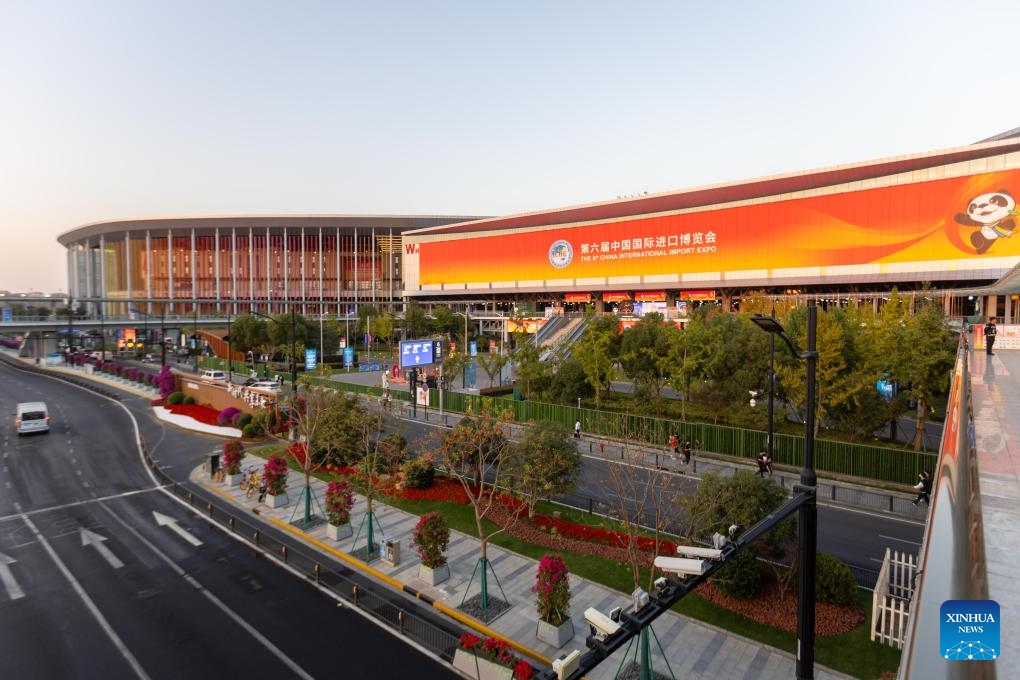
This photo taken on Oct. 31, 2023 shows the street view outside the venue for the 6th China International Import Expo (CIIE) in east China's Shanghai. The 6th CIIE is scheduled to take place in Shanghai from Nov. 5 to 10.(Photo: Xinhua)
The American Chamber of Commerce (AmCham) in Shanghai announced on Thursday that it will co-host the American Food and Agriculture Pavilion with the US Department of Agriculture at the upcoming China International Import Expo (CIIE), marking the first official US participation in China's major import fair since its first edition in 2018.
While some US businesses had been attending the expo on a regular basis, US government agencies had not led delegations to the event before. The announcement on Thursday represented the latest sign of improving ties between China and the US amid intensifying official and business exchanges, and it could pave the way for more engagement despite some US politicians' decoupling push, trade experts said.
The US agricultural pavilion at the CIIE will feature 17 exhibitors showcasing the best in American agricultural products ranging from meat, almonds and cheese to wine and health supplements, according to AmCham Shanghai.
"This will be the first official American pavilion at CIIE," the chamber said in a statement. "AmCham Shanghai hopes that the pavilion will support more US exports to China and stronger commercial ties."
This year's CIIE will be held in Shanghai from November 5 to 10. It will be the first complete return to in-person exhibitions since the outbreak of the COVID-19 pandemic.
Enthusiasm for the world's largest import-focused expo is running high, as guests from 154 countries, regions and international organizations are expected to attend, and more than 3,400 exhibitors and 410,000 professional visitors have registered to attend the event, fully returning to pre-pandemic levels, according to the Ministry of Commerce (MOFCOM) on Thursday.
At the US pavilion, exhibitors include agricultural product associations such as the US Meat Export Federation, the USA Poultry & Egg Export Council, the USA Rice Federation and the US Cranberry Marketing Committee. Participants from several US states known for their agricultural industries such as Idaho and Georgia will also be in attendance. Various organizations and companies based in the state of California, including the Almond Board of California, will also be at the pavilion.
The participation of US agricultural associations and companies and big agricultural states underscored the importance of agricultural trade between China and the US, particularly given the US agricultural industry's great interest in expanding exports to China, Chinese experts said, adding that growing sub-national cooperation has also been highlighted.
Gao Lingyun, an expert at the Chinese Academy of Social Sciences in Beijing, said that as shown by the recent successful China visit of California Governor Gavin Newsom, there appears to be a "breakthrough" for deepening cooperation with China. "There may be more intensive exchanges in the future," he told the Global Times.
In addition to the food and agricultural pavilion, other US companies, including
chipmaker Micron, are participating in the CIIE, underscoring their determination to hold onto the Chinese market despite the US government's crackdowns and blockades.
Meanwhile, some US banks, manufacturing firms and industry bodies have expressed concerns to the US Treasury Department, warning that an executive order signed by President Joe Biden in August to restrict investments in certain fields in China could hurt innovation and calling for a more limited scope, according to media reports.
Commenting on such reports, Shu Jueting, a spokesperson for the MOFCOM, on Thursday harshly criticized US restrictions on its firms' investment in China and "decoupling" moves under the guise of "national security" and "de-risking," which seriously affect the normal business decisions of enterprises, undermine the international economic and trade order, and disrupt the security of global industry and supply chains.
"Seeing other people's development as a threat and economic interdependence as a risk will not allow one to live better and develop faster," Shu said, urging the US to stay true to its pledge of not seeking to decouple from China or contain China, and to scrap investment restrictions targeting China and create a favorable environment for China-US economic and trade cooperation.




